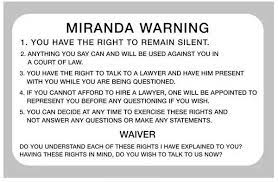Miranda Warnings and Limitations 2022 Best

This assignment involves writing an essay focusing on the Miranda Warnings and Limitations of the Criminal Justice System. The essay will be be 750 to 1,000 words, 5-7 pages (not including cover page and reference page), double-spaced, with a font size of 10 to 12 pt.
Miranda Warnings and Limitations
Write an essay addressing the topic below. Your essay should be 750 to 1,000 words, 5-7 pages (not including cover page and reference page), double-spaced, with a font size of 10 to 12 pt. Your paper should comply with APA. Refer to the Grading Rubric PDF(opens in a new tab) for essay grading standards. Submit your essay to your instructor. In each of the criminal justice systems, describe the roles, duties, and responsibilities of those functions to ensure the rights of the accused are upheld and carried out. What are the implications if one or more of the functions fails to exercise these responsibilities?
Miranda Warnings and Limitations
Use examples (such as case law) to demonstrate where a system failure has led to consequences and consider how society would operate if the Bill of Rights never existed. The Rights of Suspects In addition to protecting the personal freedoms of individuals, the Bill of Rights protects those suspected or accused of crimes from various forms of unfair or unjust treatment. The prominence of these protections in the Bill of Rights may seem surprising. Given the colonists’ experience of what they believed to be unjust rule by British authorities, however, and the use of the legal system to punish rebels and their sympathizers for political offenses,
the impetus to ensure fair, just, and impartial treatment to everyone accused of a crime—no matter how unpopular—is perhaps more understandable.
Miranda Warnings and Limitations
What is more, the revolutionaries, and the eventual framers of the Constitution, wanted to keep the best features of English law as well. In addition to the protections outlined in the Fourth Amendment, which largely pertain to investigations conducted before someone has been charged with a crime, the next four amendments pertain to those suspected, accused, or convicted of crimes, as well as people engaged in other legal disputes. At every stage of the legal process, the Bill of Rights incorporates protections for these people. The Fifth Amendment Many of the provisions dealing with the rights of the accused are included in the Fifth Amendment; accordingly, it is one of the longest in the Bill of Rights.
Miranda Warnings and Limitations
The Fifth Amendment states in full: “No person shall be held to answer for a capital, or otherwise infamous crime, unless on a presentment or indictment of a Grand Jury, except in cases arising in the land or naval forces, or in the Militia, when in actual service in time of War or public danger; nor shall any person be subject for the same offence to be twice put in jeopardy of life or limb; nor shall be compelled in any criminal case to be a witness against himself, nor be deprived of life, liberty, or property, without due process of law; nor shall private property be taken for public use, without just compensation.”
Miranda Warnings and Limitations
For purposes of this lesson, we will discuss what is perhaps the most famous provision of the Fifth Amendment which is its protection against self-incrimination, or the right to remain silent. This provision is so well known that we have a phrase for it: “taking the Fifth.” People have the right not to give evidence in court or to law enforcement officers that might constitute an admission of guilt or responsibility for a crime. Moreover, in a criminal trial, if someone does not testify in his or her own defense, the prosecution cannot use that failure to testify as evidence of guilt or imply that an innocent person would testify. https://youtu.be/FmvYIqRp_Co
Miranda Warnings and Limitations
This provision became embedded in the public consciousness following the Supreme Court’s 1966 ruling in Miranda v. Arizona(opens in a new tab), whereby suspects were required to be informed of their most important rights, including the right against self-incrimination, before being interrogated in police custody. However, contrary to some media depictions of the Miranda warning, law enforcement officials do not necessarily have to inform suspects of their rights before they are questioned in situations where they are free to leave. Miranda Ruling The Fifth Amendment to the United States Constitution(opens in a new tab) states that no person shall be compelled in any criminal case to be a witness against him or herself.
Miranda Warnings and Limitations
Additional Files







